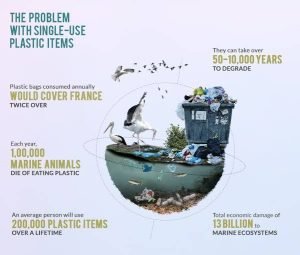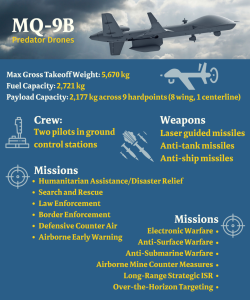Prelims – 26th Oct 23
Single Use Plastics
A single-use plastic is an object made of plastic that is intended to be used “only once” before being disposed off or recycled.
Single-use plastic has among the highest shares of plastic manufactured and used — from packaging of items, to bottles (shampoo, detergents, cosmetics), polythene bags, face masks, coffee cups, cling film, trash bags, food packaging etc.
What is Plastic Made of?
- Plastic is derived from the fossil fuels natural gas and crude oil.
- Plastic also contains chemicals that are known endocrine disruptors and pose a threat to human health.
- Human exposure to plastics with these chemicals can cause hormonal imbalances, reproductive problems, and even cancer.
Impact of single use plastic on environment:
- Disposable plastics, such as plastic straws, bags, coffee stirrers, food packaging, and soda and water bottles, never break down completely. Instead, they degrade and become microplastics and continue to pollute the environment
- It take thousands of years for plastic bags to decompose, thus contaminating our soil and water in the process. The noxious chemicals used to produce plastic gets transmitted to animal tissue, and finally, enter the human food chain.
- Plastic, which is a petroleum product, also contributes to global warming. If plastic waste is incinerated, it releases carbon dioxide into the atmosphere, thereby increasing carbon emissions.
- Every year, countless animals are killed by plastic. Seabirds, fishes, turtles and marine mammals are found to have fishing gear or plastic bags in their stomachs.
- The world’s oceans are packed with floating plastics. This plastic in the ocean get converted into the microplastics. These microplastics get in the mouth, stomachs and digestive system of fishes, shellfishes and birds. Thus, it becomes part of the food chain of aquatic and human life.

Oslo Forum
India participated in Norway’s Oslo Forum organised for peace talks on Afghanistan. The Oslo Forum (started in 2003) is a series of retreats for international conflict mediators, high-level decision-makers, and other peace process actors. The Forum is co-hosted by the Royal Norwegian Ministry of Foreign Affairs and the Centre for Humanitarian Dialogue (HD).
India’s Approach towards Taliban
- India has not recognized the Taliban regime but has engaged with it on humanitarian and security issues.
- India’s main objectives in Afghanistan are to protect its security interests, to prevent any terrorist threats from Afghan soil.
India approved acquisition of MQ-9B from US

